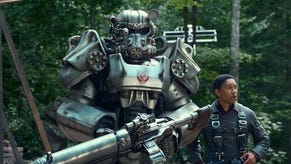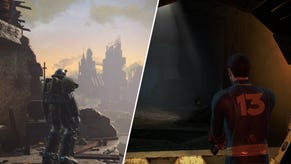"What son?": even Fallout 4 doesn't give a s**t about Shaun
Fallout 4 has some of the best writing and characters of any Bethesda game - outside the main plot.
There's this thing a lot of video games, movies and other media do where they introduce a character and then take them away, and this becomes the primary motivation for the protagonist's journey.
Nominally, the main story of Fallout 4 is a parent’s quest to find their child. In reality, shoot-and-loot, exploring side stories and building a settlement network are far more memorable.
In the past the player or viewer was expected just to be on board this motivation immediately; we're supposed to hate the baddies because the baddies took our thing. Nowadays it's become so tired that most creators make at least a token effort to show us why we ought to care about whoever it is who has been murdered or abducted, by showing the protagonist enjoying an idyllic home life with their loved one before they are violently removed. Think Middle-Earth: Shadow of Mordor, where you press a button to stealthily kiss your wife (and this is very cute).
Sometimes this is successful and other times it is rubbish; generally, we don't get enough time to develop any interest in or feelings for the stolen character. We don't get to see them as a person - only as something belonging to the protagonist.
This is such a common trope that I can't be bothered getting out of bed to criticise it, but I mention it here because I think the example presented by Fallout 4 is pretty interesting. For one thing, if you choose to play as a woman, a man suffers at the hands of the baddies, which is (sadly) a remarkably rare role reversal of the standard execution.
For another, nobody gives a s**t about it - including Fallout 4 itself.
Nominally, the main story of Fallout 4 is a parent's quest to find their child. In reality, shoot-and-loot, exploring side stories and building a settlement network are far more memorable.
This is not a problem unique to Fallout 4, of course - welcome to open world video games! - but Bethesda has dropped the ball by failing to make that central story compelling. There are only a very few conversations where the protagonist's emotion shines through, and for the most part the whole "find my son" quest is lacking the narrative and emotive hooks of other aspects of the game.
There’s a ludicrous disconnect between the Vault Dweller’s occasional bursts of emotion and the fact that they just spent six in-game weeks building a giant dong instead of looking for Shaun.
Take the companion side stories, for example. Despite the chore of tracking down HoloTapes across Massachusetts, I was far more interested and invested in investigating Nick Valentine's troubled relationship with his memories than in finding Shaun. This is because I care about Nick Valentine, an intriguing man whom I'd built a relationship with. I have spent time hanging out with several of Fallout 4's NPC companions and so far each of them has been far more complex and coloured-in than we have (unfortunately) come to expect from video games. I want to know their stories. I enjoy their contextual observations.
These characters are far more important to me than a mini nuke-sized NPC who can't even talk. Perhaps if I had children of my own - or, you know, any interest in them whatsoever, I might feel more motivated, but the real problem is with the Vault Dweller, not Shaun. Their quest to find their kid just isn't foregrounded enough for me to care about it. There aren't enough moments where my character convincingly expresses that motivation for me to believe in it - even if you follow the main plot devotedly right from the opening of Vault 111. If you don't stick to the main plot, there's a ludicrous disconnect between the Vault Dweller's occasional bursts of emotion and the fact that they just spent six in-game weeks building a giant dong instead of looking for Shaun.
Again, this problem isn't unique to Fallout 4. Whenever you allow a player to role-play and make decisions about a character, especially in a non-linear open world setting, you have to accept that the player's actions and motivations may not line up with the story's intentions for that character. What makes the pronounced disconnect surprising here is Bethesda has been tremendously good at managing it in the past.
If you look back on Bethesda's previous games, you'll see that Fallout 4 represents a new approach. Morrowind, Oblivion, Fallout 3 and Skyrim all present a blank slate character; although the player is handed the keys to the main plot, the game fiction easily accommodates their potential decision not to engage with it (as an aside, Skyrim and Oblivion's escalating crisis states were an excellent way to maintain the urgency of story missions once the player did get started; you were motivated to finish things off to prevent nasties attacking you every few minutes).
The infrequent and generally lacklustre references to the central plot, as well as the superior content to be found elsewhere, render it entirely forgettable.
Fallout 4 tries something new. It locks the player down into a role - an ex-soldier or lawyer on maternity leave, happily married with a beloved child - and decides their motivation for them. This might have worked if Bethesda had been more committed to it (maybe by having a few conversations where the Vault Dweller reflected on their happy home, and the bond they felt with Shaun) but the infrequent and generally lacklustre references to it, as well as the superior content to be found elsewhere, render that central plot entirely forgettable. And that's well before a story twist two-thirds through shakes your hand, wishes you well, and gives you permission to forget the whole thing and embroil yourself in inter-faction politics instead.
This experiment in forced role-playing hasn't been a glorious success, although I'm very interested to see what Bethesda learns from this approach for its next title.
Despite the weird disconnect between me as the player and the main story's half-assed attempt to characterise my avatar, I actually had a great time role-playing in Fallout 4.
The story I lived kicks off in a horror dystopia of heteronormativity where the societal expectations of a militarised America have locked me into an existence I hate: clawing my way into a law degree in a bid to gain some power over my own life, locked in a sham marriage with my gay best friend, forced to give up my one shred of independence to breed a new generation of bodies to tend the capitalist machine. We cannot even speak honestly to each other, fearful of the machines inside our corporate-issue walls, and can only share our anguish in our oddly still expressions. In this world, the child in the crib is important to me only in that he is beloved of my closest friend, and the only thing that belongs - nominally - to us.
When the bombs fall, it is something of a relief. When I emerge into a new world where everything that once trapped me has been crushed and swept away, where I can build a new and better life outside of the control of a military-industrial complex that seeks to homogenise and dull its citizens into perfect little gears, it is a revelation. When I meet a witty and courageous truth-teller with a mile-wide independent streak and a quirked, subtle smile, it is a revolution.
What son, Fallout 4?
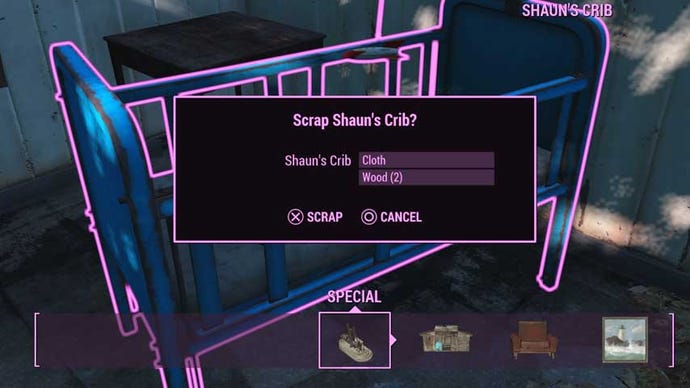




.png?width=291&height=164&fit=crop&quality=80&format=jpg&auto=webp)
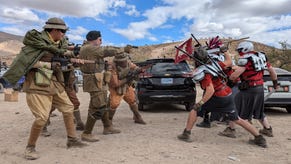
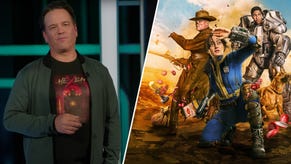
.jpg?width=291&height=164&fit=crop&quality=80&format=jpg&auto=webp)


